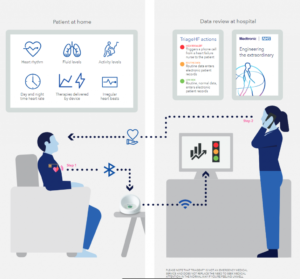A new heart failure remote alert system for implanted heart devices has proven to dramatically reduce the number of hospitalisations and improve patient care with minimal staffing time. This is according to Manchester University NHS Foundation Trust (MFT) research, supported by the British Heart Foundation and presented at the European Society of Cardiology (ESC) Congress in Barcelona.
Heart failure is a debilitating condition that impacts the lives of nearly one million people in the UK. For the majority of patients with heart failure there is no cure, and so treatments focus on stabilising the condition and managing symptoms. Many patients with severe heart failure are fitted with a heart monitoring device that detects and treats dangerous, irregular heart rhythms.

Researchers at MFT and The University of Manchester have developed a new remote monitoring pathway, called ‘TriageHF Plus’, that acts like a risk detection tool and takes advantage of the health data routinely collected by pacemakers and implantable cardioverter defibrillators (ICDs).
The information – including heart rate, heart rhythm, physical activity, and fluid build-up in the lungs – is automatically streamed to the hospital from the patient’s home.
The remote alert system notifies doctors and nurses when a person’s condition becomes ‘high risk’ of them being hospitalised within 30 days, prompting a phone consultation to assess their condition.
Where a secondary intervention is needed, the heart failure nurse might change the patient’s medication, advise lifestyle changes such as a reduced salt intake or increases movement, escalate their heart failure appointment, or call them in for more tests, all with the aim to reduce the risk of hospitalisation. For a small minority, they might refer them to their GP or the Emergency Department for further tests.
The team recruited a total of 758 patients, the majority of whom had heart failure, from three hospitals in Greater Manchester who were already fitted with an ICD or pacemaker – 443 were monitored with the new TriageHF Plus alert system and 315 patients received standard care from their device.
They found that the rate of hospitalisation was 58 per cent lower in patients whose devices were monitored by TriageHF Plus. In this group, the remote alert system issued a total of 196 ‘high risk’ alerts, which led to a phone call assessment in 182 patients. Of the 182 phones calls, 79 (43 per cent) were confirmed to have an acute medical issue, from which 44 people received a secondary intervention.
The initial phone consultation took an average of just ten minutes, with an average nine minute follow-up call 30 days later. The team, led by Dr Fozia Ahmed, Consultant Cardiologist at Manchester Royal Infirmary, part of MFT, now hope that their new remote alert system that requires minimal workforce resource will help to monitor patients with a cardiac device and heart failure across other hospitals in the UK.
Dr Joanne Taylor, BHF Clinical Research Fellow, based at MFT and The University of Manchester, said:
“People with heart failure tend to come to hospital for checks every six months, but for some their condition can decline rapidly between appointments. The beauty of this remote alert system and our pathway is that it immediately issues an alert in real time when a potentially significant change in the patient’s health related data is detected, at a time when the patient may be deteriorating. This means we can strike while the iron is hot and intervene early to prevent them getting too ill and being hospitalised.
“It also gives us a great platform to care for heart failure opportunistically, where the phone consultation might flag other health concerns such as pneumonia or frailty. It’s a no-brainer for helping to keep heart failure patients out of hospital.”
Professor Sir Nilesh Samani, Medical Director at the British Heart Foundation, said:
“Heart failure is a debilitating disease that in the more severe cases requires repeated need for in-patient hospital care because of deterioration in the condition. This remote alert system is potentially a game-changer for people living with heart failure as their condition can be continually monitored and action taken if there are signs of deterioration thus reducing the need for hospitalisation.
“At a time when patients are facing record long waits for cardiac care, it’s vital that we embrace scientific innovations like this that can help relieve pressure on the health service by providing simple and effective ways to ensure heart patients receive swift treatment and care outside of hospitals.”